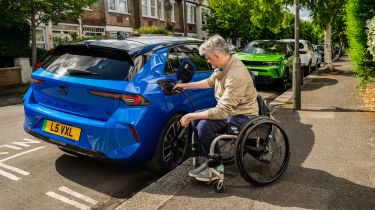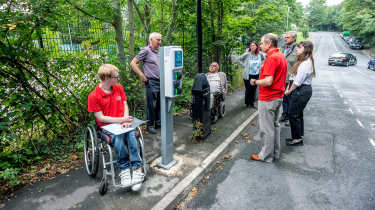Accessible EV charging still a distant dream as progress stalls under Labour
‘Outrage’ over lack of chargepoint accessibility regulation turns into a government review

Two years ago, the UK’s public chargepoint accessibility standard PAS 1899 was launched by then transport minister Lucy Frazer. “This new Government-backed standard will help the industry to create and install chargepoints that everyone can use easily, making the experience better and fairer for disabled people,” she promised.
Yet far from celebrating two years of progress from a ‘British Standard’ that was introduced on a voluntary basis only, disability groups are instead highlighting the lack of progress, and renewing demands for accessibility standards to be made compulsory.
Former paralympian Baroness Tanni Grey-Thompson told a recent All-Party Parliamentary Group on EVs that it was “appalling” that disabled people were having to fight for legislation retrospectively. Many also point to the provisions of the Equality Act 2010, saying public charging facilities that discriminate against them are illegal under British Law.
Back in 2021, the Department for Transport refused to tell Auto Express whether the UK’s Equality Act applied to charge point operators (CPOs), but Labour Shadow Transport Minister Kerry McCarthy was outspoken in her condemnation of the Conservative government’s failure to act.
“It is shocking that, after years of providing taxpayer funding for the installation of electric vehicle chargepoints, the government still hasn’t set out regulations to ensure chargers are accessible,” McCarthy said. “The Equality Act (2010) is clear that there is a duty to make reasonable adjustments to ensure those with disabilities are not at a disadvantage. The continued lack of regulation or guidance to ensure this is the case is a clear failure of that duty by the government.”
Now Labour is the government, but there’s been no swift move to address that ‘clear failure’ highlighted by McCarthy. Instead the DfT – led by transport secretary Louise Haigh – told us it is supporting a review into PAS 1899, which it will report on next year, and “use the findings to inform whether further intervention is required”. Even now, under Labour, the DfT appears unable, or reluctant, to confirm whether UK Equality Act provisions apply to public chargepoint operators rolling out infrastructure.
The Motability Foundation charity, which helps hundreds of thousands of disabled drivers get on the road, part-funded the development of PAS 1899, along with the Department of Transport, and at the time Motability chief executive Barry Le Grys declared that the charity was proud of its involvement, saying: “This standard will aid providers in developing new infrastructure at a pace that is fit for the future.”
Given the lack of subsequent pace, we asked Catherine Marris, head of innovation and policy at the charity, whether PAS 1899 was failing.

“We recognise that voluntary uptake of PAS 1899 has been slow to date, which is why we believe now is the time for the standard to be made mandatory by law,” she told us. “Providers of public charging should be taking responsibility for ensuring their infrastructure is accessible, so disabled people are not left behind in the move to electric cars.”
Current data on the number of accessible public chargers is hard to come by, because there’s no compulsion for CPOs to provide it. However, we recently reported research by the Vauxhall Electric Streets campaign suggesting fewer than two per cent of on-street public chargers meet PAS 1899 specifications, while only 0.5 per cent of chargers are in disabled parking bays. Progress on more accessible charging is evident at some larger charging hubs, but these are often out of town and don’t meet the requirements of local drivers.
“At the Motability Foundation we believe that every public chargepoint in the UK should be accessible for disabled people,” said Marris.
Vicky Read is head of Charge UK, the trade organisation representing CPOs, and she described the question as to whether members have responsibilities under the Equality Act as “really interesting”.
“PAS 1899 is a specification drawn up by the BSI that put down for the first time what users with accessibility needs require from a charging experience,” she told us. “What PAS can’t do is set out the broader picture, including the legal situation.”
According to Read, issues such as electricity standards, and rules and regulations on parking and the built environment, all make the accessibility issue hugely complex.
“An individual charger doesn’t exist in a vacuum,” she said, claiming industry stakeholders are confused by the various responsibilities. “Charge operators are only one entity involved in making this happen. Obviously the landowners and the local authorities take decisions about how and where chargers are placed, dropped kerbs and all sorts of things like that.
The hardware manufacturers also have a role, so I think clarity around how it all fits together, and who’s responsible for what, is really important. I don’t think we have an answer to that at the moment.”
Charge UK is one stakeholder in the government-sponsored two-year review of PAS 1899, being carried out by the British Standards Institute. Read said the review group is trying to make sense of where responsibilities lie. “Compliance sits across a multitude of stakeholders, and CPOs are deploying infrastructure and operating it with lots of different entities,” she said. “If something doesn’t exist on the global market, we can’t purchase it, and some of the PAS 1899 specifications require things that don’t exist.
Similarly, things like dropped kerbs are within the power of the local authority. One of the things the BSI group is trying to do is make sense of this so that everyone knows what their role is.”
Critics might say these same challenges have been evident for years, but Read is resistant to the suggestion that market competition won’t allow for faster progress on chargepoint accessibility, with CPOs focused most intently on grabbing market share or investor returns. She also said now is not the time for regulation on accessibility standards.
“We’re under huge pressure from the government, the automotive sector, and from drivers to get the infrastructure out there. So we’ve got to do that, and we’ve also got to make sure we don’t leave anyone behind; the two things have to run in parallel,” she said. “This is also being funded by private-sector investments, so it’s got to be commercially viable.”
Read also rejected the proposition that PAS 1899 is failing. “Publishing the standard two years ago was an important step because before that, nothing was captured about what was required. I think the level of awareness in the EV industry, from CPOs, investors and the people we work with has rocketed. So there’s no question it’s had an impact,” she said.
Now the challenge is to work out what’s possible, said Read. “All these challenges that we’ve identified are not us saying no, it’s saying we can’t do this as it’s currently described. So can we find an alternative way of doing which still meets the needs?”
Our Campaign
Auto Express launched its ‘Equal Access for All’ campaign on charging infrastructure, after being invited to witness charity Disabled Motoring UK undertaking an audit of Brighton and Hove City Council’s public chargers in October 2021.
Even then, the accessibility challenges faced by drivers using public chargers, and those faced by the chargepoint providers, were well understood. Our campaigning included the first public independent test of the draft proposals on PAS 1899, which revealed its ineffectiveness, and helped result in a rethink to make the standard more robust. We will continue to support calls for accessible charging, as long as the problem is unaddressed.
Switching to an EV? These are the best electric cars...






